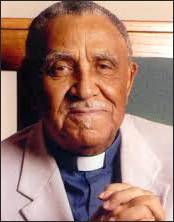Joseph Lowery
Joseph Echols Lowery (1921-2020) is a minister in the United Methodist Church and leader in the American civil rights movement.
Bio from Wikipedia, 1/4/2012
 Lowery later became the third president of the Southern Christian Leadership Conference, after Rev. Dr. Martin Luther King and his immediate successor, Rev. Dr. Ralph David Abernathy, and participated in most of the major activities of the African-American Civil Rights Movement of the 1960s.
Lowery later became the third president of the Southern Christian Leadership Conference, after Rev. Dr. Martin Luther King and his immediate successor, Rev. Dr. Ralph David Abernathy, and participated in most of the major activities of the African-American Civil Rights Movement of the 1960s.
In 2004, Rev. Dr. Lowery was honored at the “International Civil Rights Walk of Fame” at the Martin Luther King Jr. National Historic Site, located in Atlanta, Georgia. According to the National Park Service, the Walk of Fame was created “to give recognition to those courageous soldiers of justice who sacrificed and struggled to make equality a reality for all.”
Early Life
Joseph E. Lowery was born to LeRoy and Dora Lowery on October 6, 1921. He attended middle school in Chicago while staying with relatives, but he returned to Huntsville, Alabama, to complete high school. He next attended the Knoxville College and Alabama A&M College, before finishing his bachelor of arts degree at Paine College in Augusta, Georgia. Lowery next entered the Paine Theological Seminary to become a Methodist minister. Rev. Lowery is a member of Alpha Phi Alpha fraternity. Later on, he completed a doctorate of divinity degree at the Chicago Ecumenical Institute. He married Evelyn Gibson in 1950, a civil rights activist and leader in her own right. She is the sister of the late Rev. Dr. Harry Gibson an activist, and Elder member of the Northern Illinois Conference of the United Methodist Church, Chicago Area.
Dr. and Mrs. Lowery have three daughters: Yvonne Kennedy, Karen Lowery, and Cheryl Lowery-Osborne.
American Civil Rights Career
Lowery was pastor of the Warren Street United Methodist Church, in Mobile, Alabama from 1952 until 1961. His career in the civil rights movement began in the early 1950s in Mobile, Alabama. After Rosa Parks’ arrest in 1955, Lowery helped lead the Montgomery bus boycott. He headed the Alabama Civic Affairs Association, an organization devoted to the desegregation of buses and public places. In 1957, along with Dr. Martin Luther King, Jr. Lowery founded the Southern Christian Leadership Conference and subsequently led the organization as its president from 1977 to 1997.
Lowery’s property was seized in 1959 along with that of other civil rights leaders by the State of Alabama as part of the settlement of a libel suit. The Supreme Court of the United States later ordered this court decision to be reversed. At the request of Dr. King, Lowery led the Selma to Montgomery march of 1965. Lowery is a co-founder and former president of the Black Leadership Forum, a consortium of Black advocacy groups. This Forum protested the existence of Apartheid in South Africa from the mid-1970s through the end of the white-minority rule there. Joseph Lowery was among the first five Black men to be arrested outside the South African Embassy in Washington, D.C., during the Free South Africa movement. Lowery served as the pastor of Cascade United Methodist Church in Atlanta from 1986 through 1992, adding over a thousand members and leaving the church with 10 acres (40,000 m2) of land.
Lowery is now retired from the ministry, but he remains active in the civil rights movement and in Christian activities.
To honor Reverend Lowery, the city government of Atlanta renamed Ashby Street for him. Joseph E. Lowery Boulevard is just west of downtown Atlanta and runs north-south beginning at West Marietta Street near the campus of the Georgia Institute of Technology and stretching to White Street in the “West End” neighborhood, running past Atlanta’s Historically Black Colleges and Universities: Clark Atlanta University, Spelman College, Morehouse College, and Morris Brown College. Perhaps not coincidentally, this street intersects both Martin Luther King, Jr., Drive and the Ralph David Abernathy Expressway.
Reverend Lowery has advocated for LGBT civil rights, including civil unions, but is more hesitant on same-sex marriage.
Recordings:
Speaker(s):
Description:
Length:
Recording Date:
Recorded at:
Speaker(s):
Description:
Length:
Recording Date:
Recorded at:
Speaker(s):
Description:
Length:
Recording Date:
Recorded at:
Speaker(s):
Description:
Length:
Recording Date:
Recorded at:
